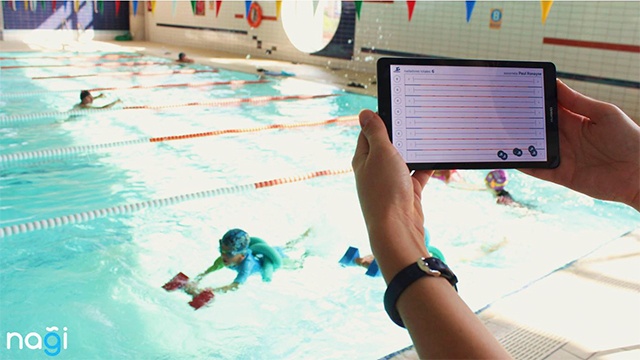The Valencian startup Nothingbutnet S.L., linked to the Science Park of the University of Valencia and winner of VLC/STARTUP 2015, launches today the technology Nagi, a device based on bluetooth signal reception that helps lifeguards to prevent possible drownings in swimming pools. The commercial opening takes place after the success of the research that has been developed for a year in the local pool of Paterna (Valencia), where it has been tested in risk groups.
Nagi -which means 'swimming' in Esperanto- requires the installation of a set of locators that surround the pool and the placement of small Bluetooth-emitting devices on the hat or goggles of swimmers. Defined a maximum period of time in seconds that a swimmer can remain immobile, the system alerts the rescuer using a smartwatch and a tablet. It also tells you where the body is located in the water.
"The alert threshold will depend on the risk of the population group. We can detect the submersion of the body from the first second. It will sound both visual and audible alert on the lifeguard's watch and on the tablet", explains Javier Bosch, CEO of Nothingbutnet. According to the World Health Organization, drowning is the third leading cause of death from unintentional trauma in the world.
Multiple advantages
The advantages of this device are diverse compared to other prior technological systems, based on underwater video cameras. "It is cheaper and easier to install because it only requires five nights of work and it is not necessary to empty the pool. In addition, the detection time is faster. The previous systems require the swimmer to sink and go to the bottom, which occurs in about 30 seconds. In contrast, Nagi detects sinking, but also any abnormal interruption of movement, therefore, can also alert to drowning on the surface", Javier Bosch underlines. "It saves life and in addition", he adds, "it will have a motivating and fun use because it will provide information about what you have swum, data that other drowning detection systems do not provide".
It is estimated that the cost of this technology for a pool of 25 meters long is approximately 25.000 euros per year. "Several Spanish cities and towns have already transmited us their interest in Nagi, as well as the state of Israel. This year we are going to start installing it in closed swimming pools. And next year in open and domestic ones ", says Nothingbutnet CEO. Paterna (Valencia), the first municipality to install this system, is a candidate to be European City of Sport, among other reasons, by the use of Nagi.
Winner of the VLC / STARTUP
Nagi technology is the third product line that brings out the company Nothingbutnet SL, founded three years ago by six partners. In 2015 it won the VLC STARTUP 2015 competition promoted by the Universitat de València through its Science Park for the development of innovative and/or technological companies based in the VLC/CAMPUS environment. Initially focused on the world of basketball, in this sport has developed two technologies of digitization (NBN23 Competition and NBN23 Performance) aimed at monitoring the movement of players and enhance the show with the provision of relevant information in real time. In fact, the technique developed to identify the players location is what has allowed the development of Nagi in the pools.
Nothingbutnet S.L., which now has 42 partners, has recently increased its capital by 500.000 euros and expects to get it bi bigger again by the end of the year. A part of it comes from business angels of the sport world, including six international basketball players who have played or are playing in the Spanish basketball team. Moreover, one of its shareholders is Shorai, a new Valencian investment group that brings together figures from other sport disciplines, such as tennis, football or swimming.
This Valencian startup has more than five national and international awards, among which is also HYPE first award at European level as Best Technology Innovation Project of 2016, whose final was held at the 2016 Olympic Games in Rio de Janeiro.


